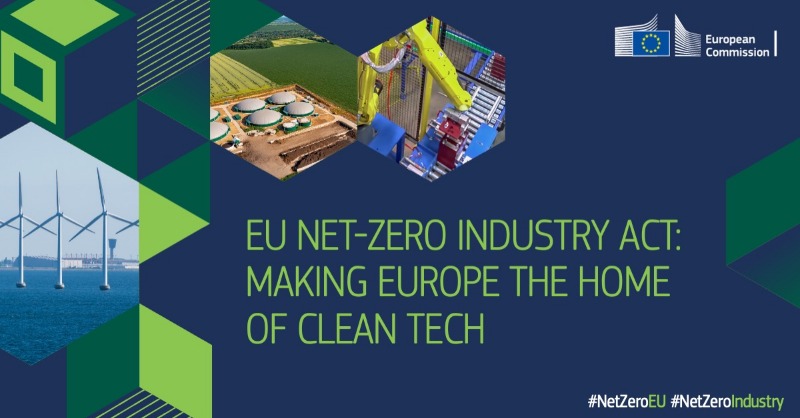
It aims to “create better conditions to set up net-zero projects in Europe and attract investments”. As a result, the EU’s overall strategic net-zero technologies manufacturing capacity should “approach or reaches at least 40% of the Union's deployment needs by 2030”. The EC says this “will accelerate the progress towards the EU's 2030 climate and energy targets and the transition to climate neutrality, while boosting the competitiveness of EU industry, creating quality jobs, and supporting the EU's efforts to become energy independent”.
The Act supports in particular “strategic net-zero technologies that are commercially available or soon to enter the market, and have significant potential for rapid scale-up to contribute to the EU’s decarbonisation targets”. These include primarily:
- Solar photovoltaic and solar thermal
- Onshore wind and offshore renewables
- Batteries and storage
- Heat pumps and geothermal energy
- Electrolysers and fuel cells
- Sustainable biogas/biomethane
- Carbon capture and storage
- Grid technologies
EC says: “Other net zero technologies are also supported by the measures in the act, including sustainable alternative fuels technologies, advanced technologies to produce energy from nuclear processes with minimal waste from the fuel cycle, small modular reactors, and related best-in-class fuels.”
NZIA looks to improve conditions for investment in net-zero technologies by "enhancing information, reducing the administrative burden to set up projects and simplifying permit-granting processes. In addition, the Act proposes to give priority to Net-Zero Strategic Projects, that are deemed essential for reinforcing the resilience and competitiveness of the EU industry".
EC President Ursula von der Leyen said: "We need a regulatory environment that allows us to scale up the clean energy transition quickly. The Net-Zero Industry Act will do just that. It will create the best conditions for those sectors that are crucial for us to reach net-zero by 2050: technologies like wind turbines, heat pumps, solar panels, renewable hydrogen as well as CO2 storage."
Before it becomes law, NZIA must be discussed and agreed by the European Parliament and the Council of the European Union.
European nuclear trade association Nucleareurope said the EC, had only partially included nuclear in the NZIA with its reference to advanced technologies and SMRs. "Whilst this is a step in the right direction, Nucleareurope believes that much more could still be achieved by including the nuclear sector as a whole and treating nuclear in the same way as other strategic technologies," it said.
Nucleareurope Director General Yves Desbazeille acknowledged that that the discussions around the inclusion of nuclear under the NZIA had “proved challenging”, adding that “it is positive to see at least some reference to nuclear technologies in the text." However, “unfortunately, this is not enough”. He pointed out that the USA has supported its entire nuclear sector by including it under the Inflation Reduction Act. “By supporting the European nuclear sector through the NZIA, the EU has the opportunity of placing us on an equal footing with other global regions, and of remaining a key player in the global competition for clean technologies," he said.
Earlier, in an open letter to officials, including Ursula von der Leyen, Nucleareurope argued that nuclear technologies are key to significantly decarbonising industrial sectors. "Not only does nuclear account for the greatest share of the EU's electricity mix (currently around 25% of all electricity produced and 50% of low carbon electricity), the European nuclear sector is composed of a highly skilled manufacturing capacity based in the EU." It added: "The nuclear industry stands ready to deliver what is needed to reach net-zero by 2050, ensure security of supply, strengthen European resilience and tackle affordability."
The letter said that in addition to existing large reactors, small and advanced modular reactor technologies are developing rapidly, and all are expected to make a significant contribution to European objectives. “We see no valid reasons why this clean technology should be excluded from the NZIA, particularly given that nuclear activities have been – quite rightly – included under the Sustainable Finance Taxonomy. We therefore insist on the inclusion of nuclear as a strategic technology under the Net-Zero Industry Act.” The letter was signed by 38 major nuclear corporations, nuclear industry forums and research centres.
Image courtesy of European Commission






